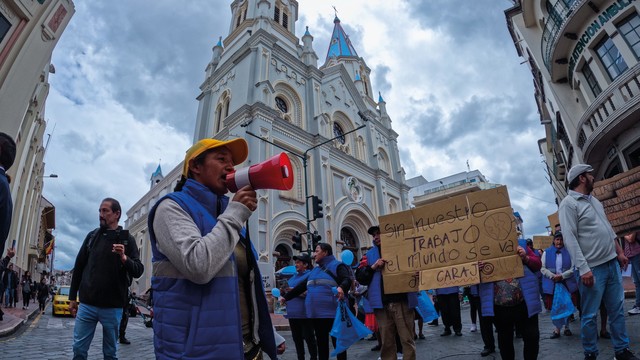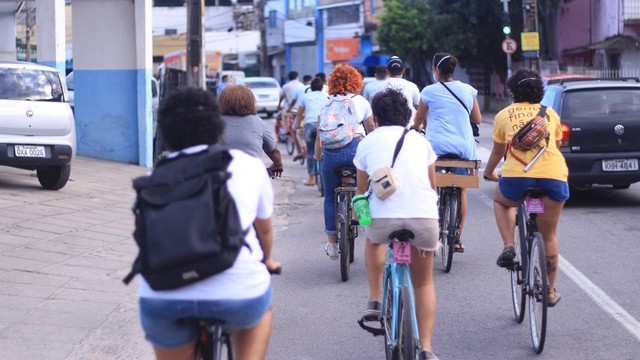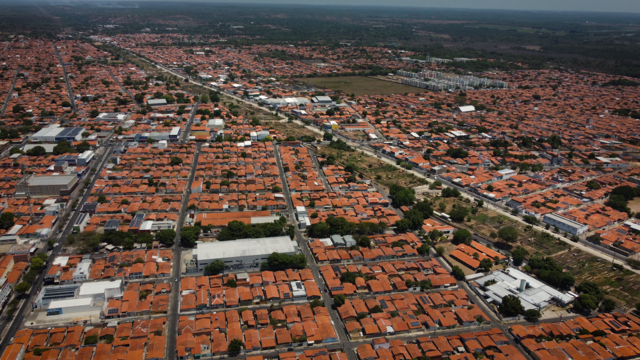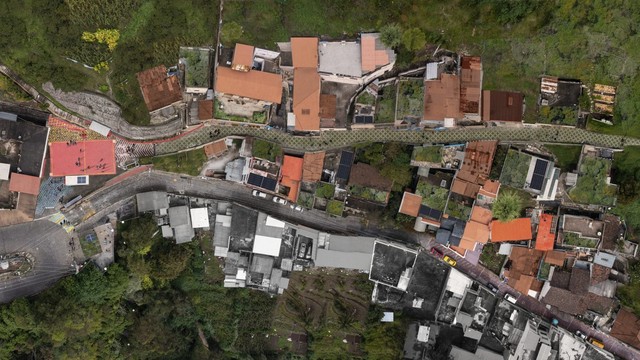San José: ecoins – promoting the circular economy and decarbonisation through public-private partnerships
The ecoins programme in Costa Rica promotes recycling and the circular economy, reduces CO2 emissions and contributes to environmental sustainability through a technological economic reward scheme.
Ecoins promotes citizen participation in solid waste management (Photo: ecoins)
The city of San José should be considered in the context of Costa Rica as a whole, not just because San José is the capital city, but because this city’s policies and actions must align with national objectives such as the Decarbonisation Plan (in Spanish) approved in 2019.
In this plan, Costa Rica’s government commited to achieve net zero emissions by 2050 and promote awareness of the link between the circular economy and decarbonisation. The country has also committed to adapt its waste management system and make it as efficient as possible, thus reducing the associated emissions, although this has yet to be fully achieved.
To advance these objectives, in 2023 Costa Rica’s environment ministry presented its National Circular Economy Strategy (in Spanish), which is currently being implemented. Despite this, in the area of integrated waste management the situation in San José is far from ideal, as the city produces a large quantity of unrecycled waste. Fifty-eight per cent of the city’s waste (in Spanish) is organic, 21% paper and card, 11% plastic, 2% metal, 1% glass and 7% is non-recyclable.
The amount of ordinary waste collected is now exceeding the capacity (in Spanish) of the landfill sites, which have been operating for several decades. Given this situation, the country as a whole needs to develop new methods of final waste disposal in order to lessen the pressure on the landfill sites and reduce greenhouse gas emissions.
In Costa Rica, 94% of solid waste ends up in landfill sites, designated waste disposal sites or open-air rubbish dumps. One of the main consequences of a badly managed landfill site is the risk of pollution of surface water and groundwater (in Spanish).
Many landfill sites, such as those in La Carpio and Aserrí, are also on the verge of collapse. These two landfill sites receive 600 tonnes of waste per day from 11 GAM cantons, and they only have two to five more years of useful life (in Spanish).
In addition to this problem, there is the issue of the illegal rubbish dumps (in Spanish) that have sprung up in various parts of the city. As well as their obvious impact on the environment, these dumps are a social and public health problem due to their encroachment on protected areas and the disease vectors that proliferate, not to mention their links with floods caused by the collapse of storm drains. These are under immense stress due to the increase in the magnitude and intensity of extreme hydrometeorological events related to climate change.
Open-air rubbish dumps function alongside the formal La Carpio landfill site, which has been operating since 2000. This means that tonnes of rubbish are piling up uncontrolled every day in places where ordinary and hazardous waste (in Spanish) is dumped and left completely untreated.
Marlen Chacón, ASOFAMISAEOne of the major advantages we see of working with ecoins is when the waste is processed, because productivity is much higher. This is because the materials we receive are now separated, so part of the work we used to do has already been done by the time these materials get to us
Ecoins: transforming the linear economy into the circular economy
In Costa Rica what people think of as rubbish is a broad category of ’ordinary waste’, comprising all kinds of different materials mixed up together. These include waste materials that could be recycled and organic waste that could be composted.
But because they are badly managed within households, they are all disposed of in plastic bags that are taken away by the municipal waste collection service. The rubbish collection lorries come once or twice a week to collect these bags and then take them to a landfill site. The cost of this waste collection, transport and landfill dumping service is covered from the municipal taxes paid by residents.
The ecoins programme arose from the idea that the final consumer is the first link in the waste recycling chain. If every household managed their rubbish appropriately, the quantity of waste that goes to landfill would be substantially reduced and a more robust market would be created for recyclable materials that could be used by companies as part of a circular economy. Ultimately, this would have a greatly reduced carbon footprint.
Once the first link in the waste recycling chain – the consumer – was clearly identified, the second step was to create an ecosystem of partners who would manage the waste delivered by households. Accordingly, ecoins built a network of different types of partners, from small family or community businesses that make their living from collecting recyclable materials and municipal collection centres, to industries that use the recycled materials in their own production processes.
The programme came up with the idea of an online platform that would connect one group with the next and serve as the means of liaison between them. On the platform, consumers can open an account or e-wallet in which they receive something of value, ie ecoins, for the materials that they send to the official recycling centres. The role of the recycling collection businesses is to allocate ecoins in accordance with the amount of material delivered to them. These collection partners receive ongoing support from the ecoins programme to answer any questions and are trained on how to use the online tool to record the recyclable waste they receive.
Business members are the third group in the ecoins programme. These are businesses, shops and companies where consumers can redeem the ecoins from their e-wallet by accessing promotions and discounts. In this way, recycled items have a direct economic value for the person who recycles their waste, thus changing attitudes about the intrinsic worth of these materials, as consumers no longer see them as worthless rubbish but as an economic opportunity.
As an another way to boost the programme and create openings for it to become involved in public policy, from the start ecoins has also included officials from the ministry of health. Its work with them has led to a series of public education campaigns on recycling both ordinary waste and special waste. For example, there have been campaigns to collect electrical and electronic items that are no longer used and campaigns to collect unused medicines.

Raising the status of the work done by the grassroots recyclers is essential for strengthening the recycling value chain (Photo: Ecoins)
The origins of ecoins
Launched officially in 2017, ecoins were originally called ecolones, from colones, Costa Rica’s official currency, and the fact that they are digital. But shortly afterwards, when the initiative started to operate outside Costa Rica, their name was changed to ecoins, adopting the English word to make the name more attractive and easily understood.
The story of the name change may seem trivial, but in fact it reflects one of the key components of ecoins communication. More than just a tech platform, ecoins is a programme that is underpinned by communication between key actors in a circular economy model. By using strategic online and conventional channels of communication and content that is carefully designed in both substance and form, ecoins has managed to position itself among different groups of people and social actors involved in waste management, as a practical tool for creating links and synergies.
Every year, ecoins publicises its work and objectives strategically, using a public relations approach. It undertakes stakeholder mapping and looks for the most effective ways to tell the public about its work and report on what it has been doing to capitalise on public engagement with the programme.
The programme also communicates constantly with its wide range of allies and strategic partners, from central and municipal government authorities and large companies to small businesses engaged in recycling. It is always looking for new opportunities to promote the circular economy and make waste collection and management processes easier.
Small-scale waste collection microenterprises are also involved in ecoins. Indeed, these grassroots recyclers are one of the groups that have benefited most from the programme, as it has helped them to increase their efficiency by working to ensure that the recycled materials are clean, dry and separated when they reach the collection point. These three conditions are key to improving waste management in terms of how much can be used, as well as health and safety for the recycling organisations.
In March 2022, a study carried by the Central American Association for the Economy, Health and the Environment found that 70% of the people working in recycling (in Spanish) at the most basic level in Costa Rica are still worried about their working conditions and the risks involved in their work, including cutting themselves and catching diseases. Others in this group told the researchers that the public still doesn’t separate waste properly and that their work is not valued. Neither do they receive proper support from national and local authorities to improve their working conditions. The ecoins programme aims to respond to this and meet the needs expressed by this group.
The ecoins programme was developed to solve the problem of poor waste management by creating a circular economy model that encourages consumers to reduce, reuse and recycle. Consumers are at the centre of the process and are encouraged to separate, wash and dry their waste materials before taking them to an official collection point. The collection points themselves are the result of the partnerships developed, which started with research carried out in the field by the ecoins team.
This led to the development of personal relationships, which have helped to strengthen the ties between the stakeholders involved, in a win-win situation. The work of forging, strengthening and maintaining these partnerships is extremely important to ecoins, because it enables the programme to continue.
The ecoins programme is not just a logistical process to collect and deliver waste: it is a comprehensive effort in which communication, education, awareness-raising and technologies all play a key role to create a system that rewards consumers for their commitment to recycling, as they receive a financial incentive every time they deliver their waste. ecoins is changing people’s views and behaviour with regard to waste, transforming it from an environmental problem into an economic opportunity that benefits everyone involved.
The combination of technology and strategic communication has led to the development of online databases that enable the materials received to be counted and categorised. It is also possible to develop programme user profiles, produce data banks of information from the organisations involved in collecting the recycling, and assign ecoins to personal online accounts.
Both in the recycling centres that receive ordinary waste and the special initiatives for collecting difficult-to-manage waste, which is dealt with by authorised companies and organisations, members of staff in ecoins partner organisations have been trained to use the online platform. They enter data about the waste delivered by each person and associate it with a specific ecoins account to record the earnings of the person doing the recycling in the app’s e-wallet.
Two examples of specific initiatives on special waste are the weekly campaign for collecting electrical and electronic items, called RAEE-TÓN, and the campaign to collect unused medicines.
The process for the consumer to deliver waste for recycling and earn ecoins can be summarised in three main steps:
- Separate: thanks to the information provided and ongoing campaigns, after consuming a product the individual concerned takes responsibility for ensuring that the waste material is clean, dry and separated
- Earn: once the waste is ready to be delivered, the user takes it to one of the authorised places, which include collection centres, special campaign sites, recycling bins and municipal waste collection lorries. The materials delivered are recorded on the programme’s tech platforms and added to an online ecoins account
- Redeem: Once the ’ecofan’ (or person signed up to the programme) has ecoins in their account, they can redeem them in special monthly raffles and/or get discounts on products and services offered by the businesses affiliated with the programme at the Ecoins website (in Spanish).
Evelyn Hernández, municipality of DesamparadosSince ecoins started the waste is much better separated when it comes in. Before, as much as 40% of what we received in our collection centres was unusable or waste that couldn’t be recycled. Now that’s changed.
The experience of implementing and using the ecoins tech platform and app has been very positive. Indeed, over time, ecoins is likely to incorporate new tools that will develop the circular economy further, no longer just focusing on recycling but also, in the short term, looking at repairs. The programme’s technology has improved with, for example, upgrades to the app to provide more self-management functions.
These enable people who recycle their materials to redeem their ecoins more efficiently and easily. Geolocation tools have also been included to make it easier for people to find the official sites where they can take their recycling, and there are also downloadable educational games for children. Improvements have been made to the information system itself to make it easier to use the data strategically for programme decision making.
ecoins considers corporate volunteering to be strategically important in the management of cities' waste (Photo: ecoins)
Results of the ecoins programme
Since its launch, the ecoins programme has managed to forge alliances with the municipal governments of 16 cantons in San José. These alliances have enabled the programme to improve local government collection centres for recycled waste. The programme has developed partnerships with an extensive network of businesses, small and medium enterprises, and large companies, which have also started to act as collection points for receiving ecoins recycling. There are now 520 official sites located all over the Greater Metropolitan Area.
As a result, 179,101,620.8 ecoins have been awarded in the GAM, and there are now 46,162 ‘ecofans’, who are regularly delivering their recyclable waste to the authorised collection centres. This has meant that 3,762 tonnes of recyclable ordinary waste has been collected in the GAM and surrounding areas, in addition to the special waste collected as a result of the specific campaigns, such as the campaign on waste electrical and electronic equipment (RAEE-TON).
Another key result that has had a major impact is the public–private partnerships with government institutions, especially the partnership with Costa Rica’s ministry of health, which has enabled very effective and socially beneficial waste collection initiatives to be taken forward.
Likewise, a network of ecoins programme business partners has been created. This has attracted a range of businesses and enterprises, 70% of which are micro, small and medium enterprises, whose customers are interested in sustainability. These are a cornerstone of the ecoins model, as they are the ones who provide the tangible ecoins incentive by offering discounts on products and services to reward responsible consumers.
Taken together, these partnership networks and waste collection points have enabled the ecoins programme to avoid 4,592 tonnes of CO2 emissions in the GAM region alone since 2018, as a result of its circular economy practices.
Finally, one intangible but very significant result for the small-scale collectors of recyclable waste is that the ecoins programme has shown the public how valuable their work is to society and put in place better conditions for the waste collectors. This has not only increased the quantity of materials received but has also shortened the collectors’ working day and improved health and safety conditions in their work.

Collection centre run by partners (Photo: ecoins)
Challenges for the ecoins programme
One of the challenges for ecoins in the near future is consolidating the current tech platform and gradually adapting it to include new tools that support the circular economy.
The programme has also set itself the objective of expanding to other cities. A recent plan is to start working in Mexico City while consolidating its activities in Misiones and Buenos Aires in Argentina; Guatemala City, Guatemala; Tegucigalpa, Honduras; Bogotá, Colombia; and Managua, Nicaragua.
The ecoins programme’s objectives are based on a trend analysis, which predicts that there will be a scarcity of materials in the future. Accordingly, the programme can offer an alternative solution to a potential shortage of raw materials due to geopolitical events, logistical problems or unusual circumstances, as happened during the pandemic in 2020.
The programme also aims to reduce the amount of energy used in the production cycle, reduce overconsumption of goods, and raise awareness of the problems caused by large quantities of discarded unrecycled waste or recyclable materials. The purpose of all this is to protect the biosphere and maintain biodiversity, the ongoing loss of which is one of the most critical issues facing humanity today.
A model that can be replicated and scaled up
The ecoins programme has the potential to be replicated and scaled up in other economies. As noted above the programme is now operating in several Latin American cities.
The ecoins model is designed to be flexible and adaptable to different realities and contexts. This is because it is based on social communication, partnership-building and the use of technologies that connect the consumer who produces waste to the available waste collection services. Furthermore, the fact that this initiative prioritises the involvement of businesses and private companies increases its social impact and widens its scope.
The mission to educate citizens about separating waste, promoting sustainable practices and encouraging the shift to a circular economy is essential for fulfilling local and global environmental commitments such as the Sustainable Development Goals, as it contributes directly to SDGs 7, 8, 9, 11, 12, 13 and 17 and indirectly to SDGs 1, 3, 6, 14 and 15.
Looking ahead
One of the programme’s objectives is to introduce a barcode scanning system that tells the user immediately whether an item is recyclable and where the nearest recycling collection point is based on their geolocation. In the near future it aims to work on developing this functionality so that it can be implemented both locally and in other cities in the countries where the programme is already operating.
María Esther Anchia, former vice-minister for healthEcoins is a very valuable and innovative tool, which came out of a public–private partnership. We believe that ecoins will enable us to achieve the waste recycling targets set in the National Recycling Strategy, as well as contributing to the recycling centres
With a view to strengthening the circular economy, in 2024 ecoins proposes to take forward a new initiative to create an online repair directory for different kinds of products and equipment. This technology will also use the geolocation tool and link it to a database of businesses that provide repair services. This will enable ecoins users to find out easily and quickly where they can take broken items to be repaired, and thus reduce consumption and unnecessary waste that causes pollution and generates huge CO2 emissions.
The international success of ecoins has meant that the programme has expanded to include more than 110,000 users (‘ecofans’), who have collected 7,000 tonnes of recyclable waste and avoided at least 8,700 tonnes of CO2 emissions. To date, ecoins has forged partnerships with more than 200 companies and 100 government allies. The growing interest in launching the programme in other cities in Latin America means that these figures will only increase.
Further reading
- Costa Rica's Sustainability Efforts towards a Circular Economy - Recent Developments, Circular Innovation Lab (2023)
- The circular economy: a missing piece in city climate action plans?, Ellen Macarthur Foundation (2023)
- Opportunity analysis for the introduction of fiscal instruments that encourage decarbonization of the management sector waste in Costa Rica (PDF), report (2023)
- Guide launched for local governments in Costa Rica to move towards a Circular Economy (2022)
- News: How Costa Rica’s capital is reimagining our urban future, UNEP (2021)
- Who is responsible for Latin America’s waste? (PDF)
Author

Karla Chaves Brenes is co-founder and director of the regional programme ecoins; she is a strategic communicator and social entrepreneur with more than 25 years of experience. She is also host of the podcast Próxima Frontera and founder of Próxima Comunicación y Relaciones Públicas.
Frontrunner cities forms part of the Transformative Urban Coalitions (TUC) project, funded by Germany's Federal Ministry of Economic Affairs and Climate Action



